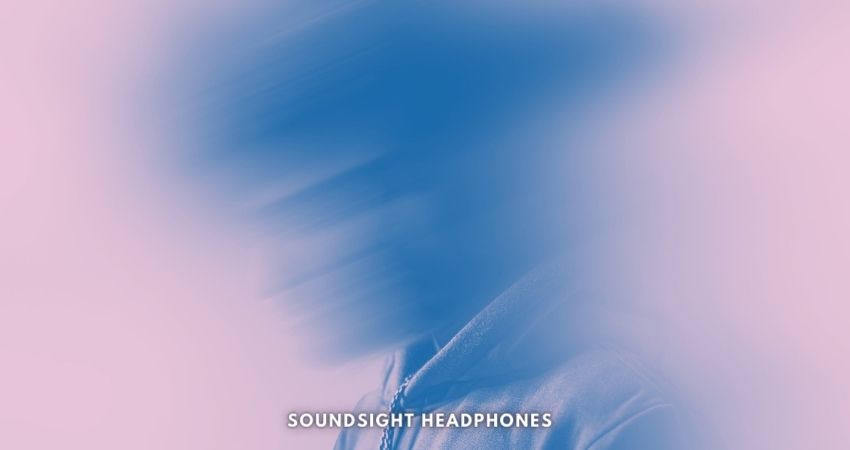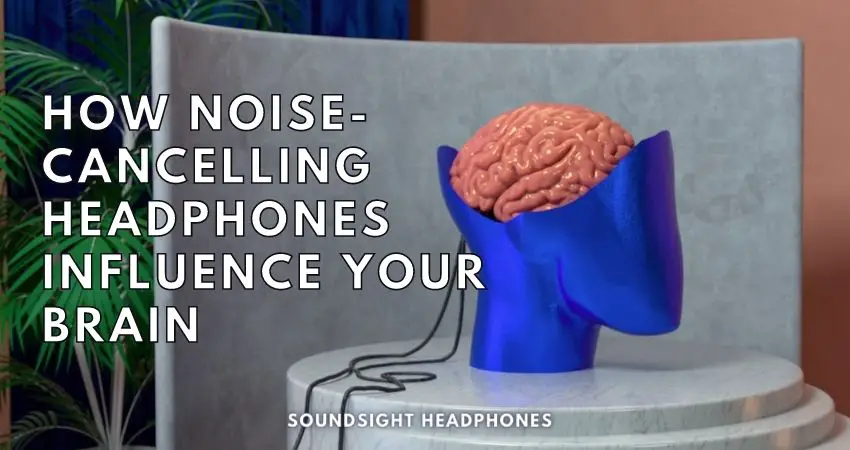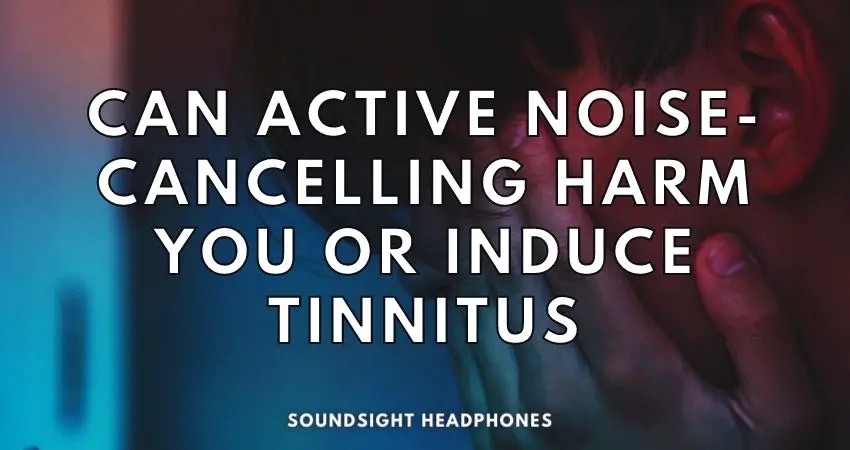Many concerns have been raised about the effects of active noise cancelling headphones. The technology is not new, but the idea that it may harm hearing is born out of a lack of understanding of how it works.
- Brief introduction to how active noise cancellation works
- Are active noise-cancelling headphones dangerous to your hearing?
- The link between noise-cancelling headphones and tinnitus
- How noise-cancelling headphones influence your brain
- Conclusion
Brief introduction to how active noise cancellation works
Before discussing the health risks and concerns of noise-canceling headphones, it is important to know how active noise-canceling headphones work.
The technology: active noise cancelling headphones work on the opposite principle to noise isolation headphones.
Instead of blocking ambient noise with physical barriers (soundproofing), they cancel it out by generating an independent signal at 180° from the original.
Are active noise-cancelling headphones dangerous to your hearing?
Headphones that use active noise-cancelling technology and the anti-phase noise generated by the ANC circuit are not a threat to your hearing and not harmful to your brain either, but can cause headaches and dizziness.
What’s a significant source of induced hearing loss is loud music played by the headphones near your ear. The closer and louder the sound source is to your ear, the more damage it does.
Noise-cancellation doesn’t induce hearing loss
Hearing loss is caused by loud noises and prolonged exposure to them. The continuity or intermittence of sound are relevant factors in the damage caused to the ears. But what best explains why active noise cancelling headphones do not harm your hearing are the following two aspects:
- Loud high frequency sounds are responsible for most hearing damage.
- Noise-cancellation doesn’t generate significant high-frequency sounds.
1. The risk of hearing loss is higher for high frequencies than for low frequencies
The frequency and amplitude of sounds determine the risk of noise-induced hearing loss, and the higher the frequency, the greater the risk to your hearing.
Because hearing hair cells are more susceptible to high-frequency sounds, these frequencies pose a greater risk.
Noise-induced hearing loss primarily affects the high frequencies (up to 16,000 Hz) more than low frequencies (less than 250Hz), and this is why hearing damage occurs faster at higher sound levels.
2. Noise-cancelling doesn’t generate significant high-frequency sounds
The ANC circuitry in noise-canceling headphones, which generates anti-noise and provides noise reduction at low and mid-frequencies, adds only an insignificant amount of noise in addition to that which is cancelled out.
The amount of noise generated is considered an artifact or noise residue and is much smaller than the total volume of noise cancelled out.
Instead, noise cancellation technology protects your hearing by reducing the level of ambient noise, which means it reduces your ears’ exposure to that noise.

Noise-cancelling headphones can cause headaches and dizziness
Vertigo and nausea are a few side effects that have been reported by some users.
Motion sickness and sound pressure buildup inside your ear are possible side effects as well in the beginning when your body isn’t used to the feeling.
Once you get accustomed to it, those feelings go away, and you’ll be able to enjoy the noise-cancelling benefits. These symptoms can also be felt by passive headphones with high noise attenuation.
Headaches are a common side effect of ANC, but you should not experience them after a while, as you get used to the differences in sound pressure levels.
Active noise-cancellation technology is responsible for some of these side effects. But the reason they occur is that it exposes the listener to new listening environments.
Why do some people get headaches and motion sickness when using noise-cancelling headphones?
Headaches are common side effects of active noise cancellation, but you stop experiencing them after a while as you become accustomed to the differences and changes in sound pressure levels.
The reason they occur is because noise-cancelling exposes the listener to new listening environments to which the brain isn’t accustomed. These effects are harmless and are not a by-product of noise-cancelling technology; rather, they are related to changes in air pressure.
Dizziness and nausea can occur when you are at a high altitude and feel a similar pressure inside your ear. The same thing happens when you use the noise-canceling feature during flights.
The link between noise-cancelling headphones and tinnitus
Before going into the relation between active noise-cancelling and tinnitus, I want to explain what tinnitus is.
I recently read a post on Quora that got a lot of attention. It’s a response to the question “What is something nobody tells you, but you wish you knew earlier?” in which Tim Denning talks about how he wished he’d known about the dangers of active noise-cancelling headphones that cause his tinnitus and decided to elaborate on the subject.
In his post, Tim Denning starts off by explaining how he wished he knew about the downsides of wearing noise-cancelling when he first received his pair of Bose noise-cancelling headphones.
An apparent connection is created between his newfound experience with tinnitus and his new noise-cancelling headphones. As such, the sound generated by the cancelling headphones is thought to be the source of his tinnitus.

What is tinnitus?
Tinnitus is an auditory symptom that’s primarily associated with hearing loss, but can be triggered by a great number of factors.
It manifests itself as a phantom sound, a high-pitched, constant buzzing noise inside the ear/head that only the sufferer can hear.
It can also be experienced as a clicking, buzzing, or hissing sound.
Is tinnitus caused by noise-cancelling headphones?
No, noise-canceling headphones do not cause tinnitus.
There has been a widespread belief that noise-cancelling headphones can cause tinnitus, but it's not true. Noise-cancelling headphones reduce uncomfortable noise levels; thus, reduce the risk of developing tinnitus.
A study by the MRC Institute of Hearing Research points to a threefold increase in the reports of tinnitus with a social noise exposure (≥ 97 dB NIL).
As such, it indirectly suggests that noise-canceling headphones have a positive impact on preventing tinnitus, a debilitating hearing disorder that affects approximately 50 million Americans, as reported by the American Tinnitus Association.
Noise-cancelling headphones are safe, but here’s what can cause tinnitus
- Tinnitus is caused by constant exposure to noise, especially high-pitched noise.
- Tinnitus isn’t always caused by high-frequency sound waves, but can be the result of inflammation, high blood pressure, stress, anxiety, jaw clenching, short sharp bursts (gunshots fired near the ear), clogged ears, deep earwax, nerve damage, hearing loss and many other causes.
- Posture can also be a cause of tinnitus (especially in the elderly). A tilt of the head and chin presses a nerve or muscle against the inner ear, causing a noise. The nerve in the auditory cortex may have abnormal activity.
- Muscle stiffness in the jaw, neck, and shoulders can cause tinnitus
- Most people with tinnitus have spent most of their lives listening to music, have developed a habit of listening at high volumes or for too long, or have been in regular contact with loud environments (clubs, concerts, loud movies, etc.).
I don’t blame Tim for suggesting that noise-canceling headphones are the cause of his tinnitus, as he is certainly just as confused and upset about the ringing in his ears and the lack of information about the cause and how to treat it.
After a brief introduction, he gave readers some information about himself, which is more strongly correlated with ringing in the ear than active noise reduction headphones:
He spent most of his youth in clubs, played drums and listened to music 8 hours a day with headphones for the past two years. These are activities that cause tinnitus.
For safe listening, the amount of time you can listen to music depends on the volume. For 8 hours a day, use a volume of less than 85 – 90 dB.
Crash Cymbal and Hi Hat reproduce a large amount of high frequency sound which can be dangerous for your hearing. As such, it’s recommended to use in-ear monitors when playing drums.
So it’s possible that Quoran misinterpreted the cause of his tinnitus, which began to become more apparent in the quiet environment created by the Bose noise-cancelling headphones as time went on.

How noise-cancelling headphones influence your brain
Noise-cancelling headphones can only affect the way brain perceives movement and direction of sounds. The sound generated by the headphones to cancel out the ambient noise is not a sound that can alter the physical characteristics of your brain. Consequently, noise-cancelling headphones are not harmful to your brain.
The dizziness and confusion I talked about earlier is due to the lack of congruence between what your eyes see and what your ears hear, that is, the information provided by the motor and auditory cortices. For example, the noise generated by active noise cancellation can trick your brain into thinking you are moving, when you are not.
Automatic noise reduction by the brain
The reason the human brain adapts so effortlessly to sound is that it has a natural noise suppression system. It ignores sounds made by familiar movements. For example, the sound of a person’s footsteps is more pronounced than the sound of your footsteps.
A study conducted on rats demonstrates that the brain has selective attention and filters out unimportant sounds.
When you focus on a person’s speech, the brain’s frequency filters adjust to the frequency band of the spoken words. You have probably noticed that ambient noise levels decrease during conversation. This is called frequency selective hearing.
“With today’s study, we offer direct evidence that this mechanism is essential to improve and enhance the brain’s ability to sense its surroundings.”
Nathaniel Sawtell
How NC headphones protect your health and keep you stress-free
More serious problems than a quick-lived vertigo threaten your health, motor skills, sense of balanced and healthy hearing. Urban noise pollution, which causes serious mental stress, is a detrimental issue that active noise-reduction headphones tackle.
Here is a study that discusses the implementation of active noise reduction in the built environment, and the concerns of urban noise pollution.
The technology of noise-cancellation is implemented in aircraft via airframe noise reduction to reduce the noise and vibration caused by the friction of air on the outside, making a smooth and comfortable flight.
The health benefits of noise-cancellation systems are significant. For those who frequently fly, travelers and everyday commuters, the benefits of noise cancellation outweigh the drawbacks.
Conclusion
In the end, is noise-cancelling technology bad for you? It depends on the user, but generally no.
Headphones that use active noise cancellation may be practical for someone who travels a lot or spends time in a gym. But for most people who just want an extra sound barrier on top of passive sound isolation, there’s not much point in using them.
That said, you can still use them if you like the way they feel on your head or if they’re part of your style. Just be aware that they’re not as perfect as the manufacturers claim.
Read this article to learn more about why active noise cancelling headphones are not that good. LINK HERE

I have had tinnitus for a very long time, most probably caused by being directly in front of the main speaker bank at a rock concert. I have set of Sony noise cancelling headphones which I hadn’t used for over 6 months in part because I suspected that they were causing the tinnitus to increase. I used them for a limited time a few days ago and feel sure that the noise level has increased quite significantly. I am now concerned that I will have to stop using them altogether which would be really disappointing. Any advice?
Steve
Hello Steve! I cannot offer any medical advice. Tinnitus has multiple causes, including loud noise exposure, which might be the case for you. However, it can also be caused by a nerve being pinched in the ear or by a nerve being irritated. You can move your head around. If the ringing varies, that could be an indication that something might be pinching the nerve in your ear. I can’t say more than that.
Opt for open models if you don’t want to give up headphones and use low volume. They have low sound isolation (only a little bit in the treble), so they don’t create a quiet environment where the ringing can be heard.
If you must travel or spend time in noisy areas, use closed-back headphones as they offer some protection from outside noise to prevent the condition from worsening, even with the ANC turned off. Also, most ANC headphones tend to have poor high-frequency cancellation and may even generate high-frequency residual noise, so it is essential to avoid them.
Go to https://www.rtings.com/headphones/tests/isolation/noise-isolation-cancellation-passive-active check for your Sony ANC headphones, click on “Graph” and see whether the “ANC On” function (the blue line) is below or above the gray line. If above, stop using the ANC.
Furthermore, these are the most popular, and probably also the most reliable, threads on a tinnitus forum which offer possible treatments for the disease.
– https://www.tinnitustalk.com/threads/thiamine-pyrophosphate-tpp-stopped-my-tinnitus.13673/
– https://www.tinnitustalk.com/threads/already-6-hours-tinnitus-free-with-cbd-oil.11281/
– https://www.tinnitustalk.com/threads/low-level-laser-therapy-lllt-for-tinnitus-%E2%80%94-experiences-dr-wilden-etc.295/
From the best of my knowledge, you can have success in reducing tinnitus with a B complex vitamin, Niacin (NA) and Creatine. Do a Google search for these and you’ll find a lot of strong evidence of these two supplements having had a significant positive effect on tinnitus.
I agree with other claims of noise airpod pro”s and causing temporary tinnitus.. Today I had no tinnitus or ringing at 11:00am, after wearing airpod pro with active noise canceling on for about 90 min, at the end of my workout I had ringing in both of my ears. This is the second time I experience this out of wearing airpods just 4 times… I had headphone safety turn on on my iphone set to 80db .. I also have Sennheiser momentum 3 active noise canceling overhear headphones and have never experience tinnitus or ringing with these……………..
Hello Tony! Next time you workout, try without the AirPods Pro to isolate the source of your tinnitus. It’s possible that the strenuous physical exercises you perform put stress on your central nervous system and induce brief ringing in ears. I experience the same thing after an intense workout and I don’t listen to headphones during my workout. Let me know how it goes.